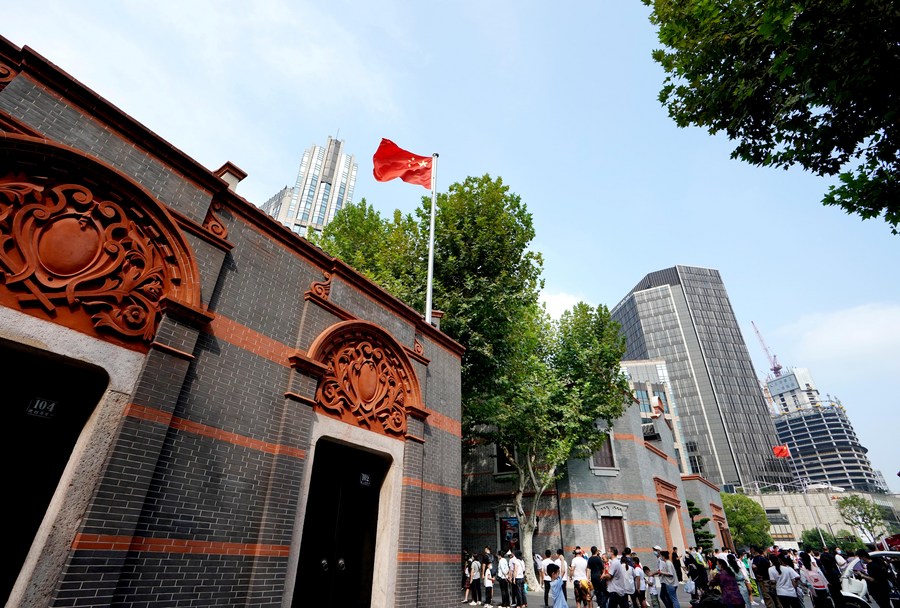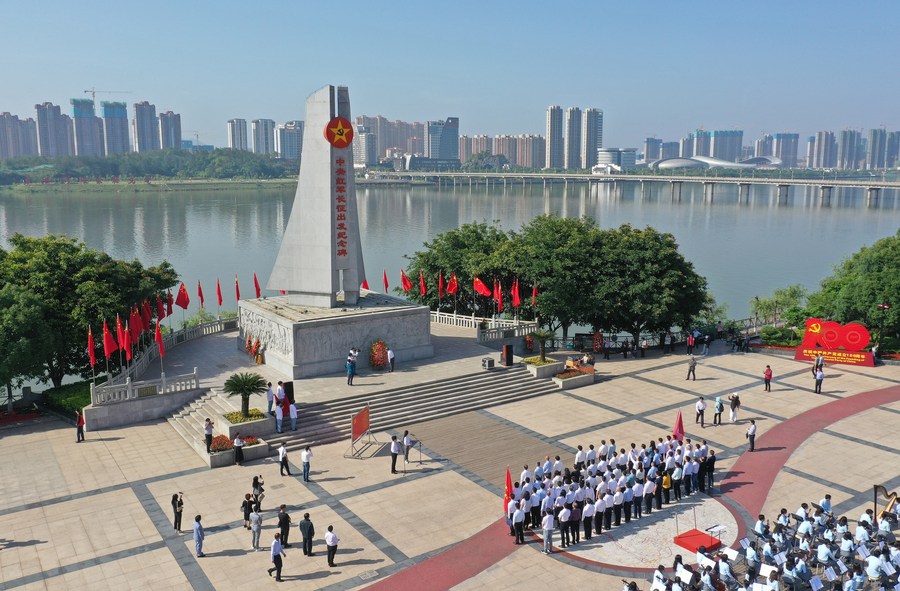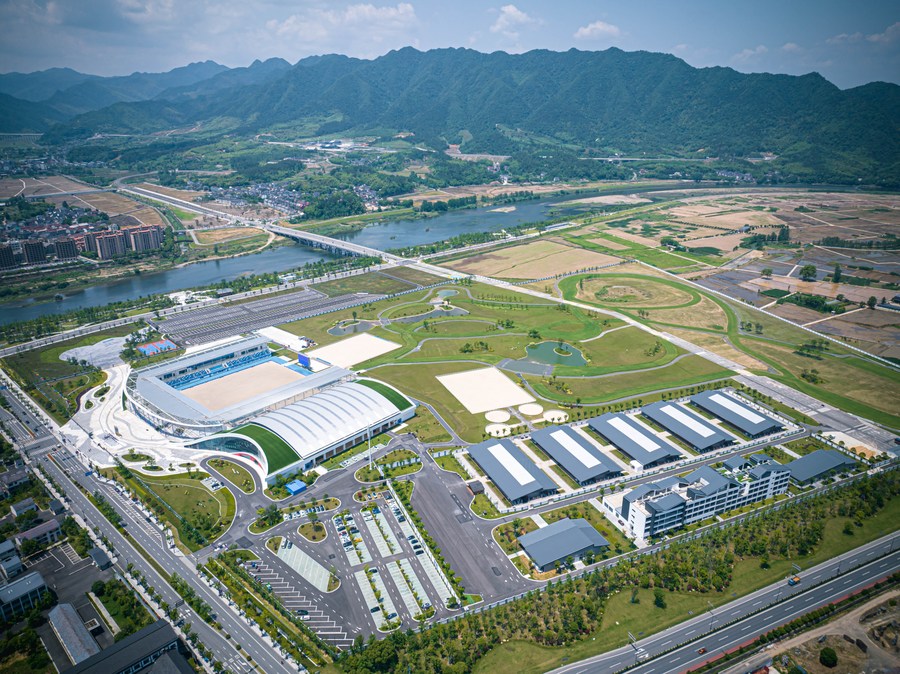102-year-old CPC attracts more talent
"Those who yearn for light will take the initiative to approach the light. It's a natural thing to do," said 43-year-old Luo Canglong, recalling why he applied to join the Communist Party of China (CPC), which is celebrating its 102nd birthday on July 1.
Being a member of a non-profit emergency rescue team code-named "Blue Sky," Luo, a former forest firefighter, had witnessed his CPC team members charging ahead regardless of dangers during past fire rescue operations. It inspired him to join them and become a member.
Over the course of a century, the CPC has evolved from a fledgling party with 50-odd members in 1921 into the world's largest governing party, boasting an impressive membership of over 98 million individuals.
Ahead of the founding anniversary of the CPC, official figures revealed that the CPC membership marked an increase of nearly 1.33 million, or 1.4 percent, from 2021 to 98.04 million at the end of 2022.
Since the People's Republic of China was founded in 1949, the CPC has governed the world's largest socialist country for more than seven decades, transforming China from a poor and backward country into the one that is on its way to become a high-income country.
The CPC's unparalleled achievements shone brightly through the annals of history. Since the 18th CPC National Congress in 2012, the Party had orchestrated the miraculous eradication of absolute poverty in a country of 1.4 billion people, one of the greatest achievements in human history. The country realized its goal of building a moderately prosperous society in all respects under the leadership of the CPC.
At the same time, China has moved closer to the center of the world stage, playing a more active role in international affairs.
In a three-year fight against COVID-19, China, guided by the CPC, secured a massive and decisive victory over the pandemic. It was amidst this backdrop that Pan Chengman, a young woman born in 1991, submitted her application to join the CPC in early 2020.
Seeing Party members working round the clock to fight COVID-19 in her virus-ravaged village in southwest China's Yunnan Province, Pan decided to join the CPC and volunteered to be a member of the COVID response team.
"After joining the Party, what I want to do the most is to help my fellow villagers to increase their income," said Pan, who set up a pig breeding cooperative in the village.
Since the very day of its founding, the Party has made seeking happiness for the Chinese people and rejuvenation for the Chinese nation its aspiration and mission.
Now, the CPC is rallying Chinese people on a new journey, aiming to build China into a great modern socialist country in all respects by the middle of this century.
Millions of Party members, through their everyday work with great dedication, made their share of contributions to the hard-won success and continue to devote themselves to the cause of the Party and the country in the new era.

People visit the site of the First National Congress of the Communist Party of China in east China's Shanghai, Oct. 1, 2022. (Xinhua/Liu Ying)
At this time of the year, the memorial of the first CPC National Congress in Shanghai is expected to have a surge of visitors paying tribute to the Party's historic founding.
Hanging on the wall are heartfelt messages left by these visitors, deeply touched by the precious exhibits that narrate the very first chapter of the CPC's history. One note reads, "Happy 102nd founding anniversary of the Communist Party of China! We will always follow the Party!"
As the head of a team responsible for organizing public awareness activities on the Party's history at the memorial, Yang Yu is making education program plans to enhance Chinese youth's sense of duty in realizing the national rejuvenation.
"Working at the forefront of promoting a revolutionary culture of the Party, I am committed to presenting the CPC's stories and its great founding spirit in more vivid and captivating ways," Yang said.

People participate in a ceremony at the monument marking the departure of the Long March by the Central Red Army in Yudu County, east China's Jiangxi Province, May 1, 2021. (Xinhua/Wan Xiang)
In another corner of China, Sun Guanfa, a descendant of the Red Army, pins a Party member badge proudly on his shirt every day -- a habit that he has kept for years.
The 74-year-old is a native of Tantou village in Yudu, east China's Jiangxi Province. The village was where the Central Red Army assembled for the Long March from 1934 to 1936, an extraordinarily bitter and arduous journey that brought about profound implication to the Party and the country.
Once a poverty-stricken village partly due to its natural conditions, Tantou Village shook off poverty in 2017.
Sun recalled that village cadres had tried every effort to help him increase his family income to pay expensive medical bills of his wife.
"Today's happy life is the result of countless revolutionary martyrs with blood, and only by constant struggle can we comfort our ancestors," said Sun. He volunteered to educate local students about the Party's history, instilling in them a sense of gratitude and responsibility to carry on the Party's legacy.
Taking examples from generations of Party members, the younger generations have also devoted themselves to national rejuvenation whenever and wherever needed.
As a Party member and head of the strategic development department of the China Xiong'an Group, Zhou Yu settled in the Xiong'an New Area in north China's Hebei Province five years ago. Zhou has been making efforts to build a digital city and promote public service innovation in the region.
"As big strides have been made in the construction of Xiong'an, we are more confident and enthusiastic than ever to devote ourselves to the 'city of the future,'" Zhou said.

This aerial photo taken on June 9, 2023 shows a view of the Tonglu equestrian center, a venue of the Hangzhou 2022 Asian Games, in Hangzhou, east China's Zhejiang Province. (Xinhua/Jiang Han)
In Hangzhou, the capital of east China's Zhejiang Province, Zou Jianhua, an official with the operation team of the Tonglu equestrian center, has been busy making final preparations for the upcoming Asian Games in September. The Tonglu equestrian center will host equestrian competitions at the Asian Games.
It took seven years for Zou to grow from a total stranger to equestrianism to a key team member that helped to hold the first international equestrian open in Hangzhou successfully, which provided a precious experience for future competitions in the Asian Games.
Zou and his colleagues, many of whom are Party members, have overcome great difficulties from the lack of previous examples for reference to the shortage of professionals in the preparation work.
"As the CPC celebrates its 102nd founding anniversary, the preparations for the Hangzhou Asian Games are also entering the final stage," said Zou. "We'll work to ensure an outstanding Asian Games."
As Zou and other people involved in the preparations for the Asian Games are working fast, Chinese scientists are also making fast progress in the development of FAST, the abbreviation for the Five-hundred-meter Aperture Spherical Radio Telescope, which is also called "China Sky Eye."
Last week, a study on the discovery made by FAST in southwest China's Guizhou Province was published in the journal Nature, exemplifying the country's breakthroughs in science and technology.
"The best way for scientists to celebrate the Party's birthday is to brighten people's lives through fruitful outcomes and embrace a better future empowered by science and technology," said Jiang Peng, chief engineer of FAST.
